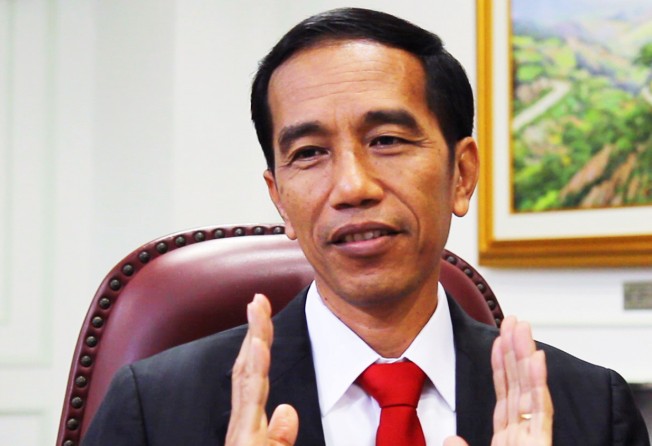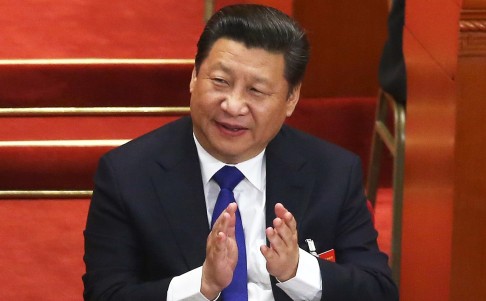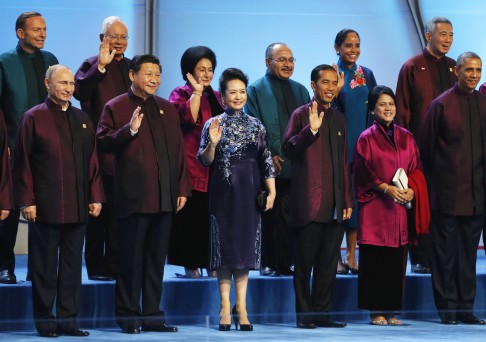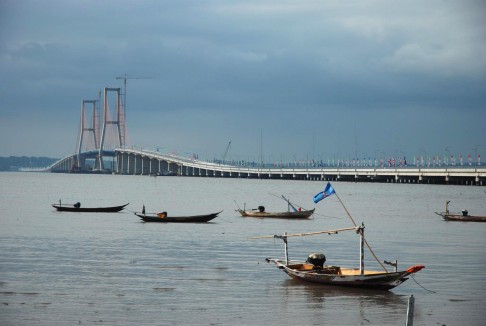Indonesia to throw open doors to Chinese investment; seeks details on maritime Silk road
In an interview ahead of his arrival in Beijing today, the Indonesian president says he will seek details on Xi's plans for a maritime Silk Road

Watch: Indonesian President Joko Widodo on improving ties in China
Indonesia is determined to open its doors to Chinese investments and significantly strengthen bilateral economic ties, even as it seeks clarity on China's vision of a Maritime Silk Road, President Joko Widodo said.
In an interview with the South China Morning Post ahead of his state visit to Beijing today , he said it was time for his country to get serious about deepening bilateral trade, investment and infrastructure links.
The Indonesian leader identified toll roads, railways, power plants and ports in his country as possible projects for Chinese and Indonesian state-owned and private companies to embark on.
"We want to focus specifically on infrastructure and manufacturing developments," he added.
He meets President Xi Jinping tomorrow. Widodo said he wanted to ask Xi for more details on the president's Maritime Silk Road vision before he could decide to endorse it.
The two leaders are expected to sign a memorandum of understanding to boost ties in several key areas. It is understood that a power plant project - Indonesia's electricity demand grows 9 per cent annually, higher than capacity growth - could be agreed upon this time.

He also hinted at his frustrations with his domestic challenges in trying to pave the way for foreign - especially Chinese - investment.
"I hope when I go to China on this trip, we have direct implementation. I don't want to only sign and sign documents and then there is no implementation," he said.
While China ranks as one of the top investors in many countries in the region, its direct investments in Indonesia have been anaemic, in 13th place, after the Netherlands, Mauritius and Taiwan.
Widodo pointed to two obstacles: bureaucratic red tape for business permits and issues of land acquisition for large-scale projects.
He said he had opened a one-stop national office to slash red tape and introduced new regulations to simplify land acquisition.
On the Maritime Silk Road issue, which he said he expected to discuss with Xi, Widodo said: "Until now, I don't know the details of the Silk Road agenda. But if the cooperation can give benefit to my people and can give benefit to our national interest and also to China, OK."
The Silk Road idea was first mooted by Xi in 2013 when he toured Southeast Asia, and is widely viewed as a response to the "Asia pivot" policy of the United States, as it calls for closer maritime and economic links.

He has pledged that Indonesia - the world's largest archipelagic state - will develop its marine resources and bolster maritime defence.
Widodo, who is called Jokowi at home, declined to be drawn into saying whether Xi's Maritime Silk Road idea would compete with or complement his plans because "there is no detailed information".
His foreign policy adviser, Rizal Sukma, told the Post that, from what Indonesia knew, Xi's idea was for economic and diplomatic ties, adding: "It should not be about hegemony. As long as they follow that framework, we would be more than happy to work together."
The Post has learned that behind the scenes, officials on both sides have begun discussing how Widodo's doctrine could complement the Maritime Silk Road vision, with the building of ports and toll roads as concrete forms of engagement.
Such an approach would dovetail with the project proposals Widodo has said he will present to Xi during their talks.
Widodo first met Xi at the Asia-Pacific Economic Cooperation (Apec) summit in Beijing in November.
Appearing relaxed during the interview at the presidential palace in Jakarta last week, he said he looked forward to his second round of talks with Xi.
He said Indonesia was ready to propose four locations on the island of Sumatra and three on Kalimantan where ports could be jointly developed.
"The last time we talked about investment and trade but we didn't know, for example, the locations, like how many and which ports and deep sea ports we want to build."
Asked how he viewed China and Xi, he replied that he was impressed at the speed with which China had made progress over the past few decades.
"We can learn from China, to make toll roads very fast, railway tracks very fast, trains ... very fast," he said, smiling.
Tom Lembong, his economics adviser, said trade flows and direct investments should be much higher given China is the world's second-largest economy and Indonesia is Southeast Asia's biggest economy.
He was hopeful big, impactful items could be agreed upon this time. "Then we could be planting some important seeds here," he added.
Indonesia can act as broker in South China Sea disputes, Widodo says
Indonesia is ready to play a consultative role as an "honest broker" in resolving the territorial disputes in the South China Sea, President Joko Widodo said.
"We need peace, we need stability in our region in Asia-Pacific. So that means Indonesia is ready to play a consultative role as an honest broker," he said in an interview with the South China Morning Post.
Indonesia wanted to ensure that the Code of Conduct (COC) - which the 10-member regional grouping of Asean is hammering out with China - would be "acceptable to all parties", he said, ahead of his visit to Beijing today.
His talks with President Xi Jinping while in the capital are expected to focus not just on deepening bilateral cooperation but also regional issues such as the South China Sea.
"We need to work together to ensure the South China Sea will not undermine Asean and China cooperation," Widodo said. "That is why the Asean-China framework is crucial to facilitating an early conclusion for the COC."
Asean countries Brunei, Malaysia, the Philippines and Vietnam have overlapping claims with China in the South China Sea, through which about US$5 trillion worth of trade passes annually.
The Philippines has lodged a case with the Permanent Court of Arbitration, while Vietnam has put up a statement of interest in the case, which allows it room for legal action in the future.
Indonesia is not a claimant state. But China's nine-dash line map, which forms the basis of its claims and covers nearly 90 per cent of the sea, overlaps with waters around the resource-rich Natunas islands that Indonesia owns.
The Association of Southeast Asian Nations is said to be keen to intensify efforts to conclude the COC amid growing concerns from some members about land reclamation activities in the South China Sea but observers have criticised the slow pace of negotiations.
Widodo admitted that progress could be faster in securing the code, which would provide, among other things, confidence-building measures, mechanisms to deal with incidents at sea and crisis management.
His foreign policy adviser, Rizal Sukma, said Indonesia also believed that part of the confidence-building measures could be achieved through joint development - a key idea that China has pursued with Vietnam.
On the other hand, Indonesia has made clear its position on China's nine-dash line. In a 2009 position paper to the United Nations Commission on the Limits of the Continental Shelf (CLCS), it said the line had no basis in international law.
Last week, the commander of the US Navy Seventh Fleet, vice admiral Robert Thomas, suggested that Asean countries could form a joint maritime patrol of the South China Sea, which the Seveth Fleet would support. This was met by an icy response from China.
Rizal said Indonesia would discuss any new ideas for the South China Sea within the ambit of the expanded Asean Maritime Forum - whose members include the US, China and India - not outside it.
"While we welcome US presence in the region, we don't need a specific US-Asean joint patrol in the [South China Sea]," he said, adding: "We want to focus first on the intra-Asean arrangements."
On the Indonesian leader's visit, Indonesia watcher Yang Razali Kassim told the Post he could not detect any historical baggage between the two sides as Widodo welcomed China as a new source of investment and growth.
"But I sense a certain return of the old ambivalence in Indonesia towards China due to Beijing's assertive and controversial claims over the South China Sea," said Razali, a senior fellow at the S Rajaratnam School of International Studies in Singapore.
Indonesia-China relations scholar Aimee Dawis said that even though bilateral ties could deepen, the South China Sea issue could prove to be a political hot potato for Indonesian diplomats in their China dealings.
Razali said bilateral ties were at a unique phase as both are helmed by new leaders trying to make their mark as presidents of big, influential countries. "How they strike a relationship … will determine their leadership roles in the region," he said.
